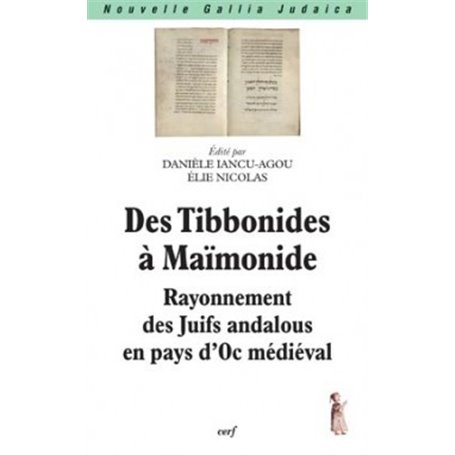Des Tibbonides à Maïmonide
Format BrochéAuteur : Danièle Iancu-Agou, Elie Nicolas

Livraison en Guyane tout compris

Retours et SAV simplifiés

Garantie Isleden
Description
L'installation de Juifs andalous en pays d'Oc est une donnée classique et connue. En butte aux persécutions des Almohades, ces adeptes d'un Islam rigoriste, des familles juives du sud de la péninsule Ibérique vinrent se réfugier en Languedoc, au moment même (années 1140) où Maïmonide et les siens trouvaient asile pour d'identiques raisons à Fès, puis en Égypte. Ainsi, la ville de Lunel accueillit l'aîné d'un lignage fameux (quatre générations de savants, penseurs, traducteurs de l'arabe en hébreu) qui allait introduire en terre languedocienne, et sous l'impulsion incitative de lettrés locaux, un vaste savoir d'expression arabe. Dans cette dynamique s'inscrivit la traduction, dans le midi de la France, du " Guide des Perplexes " de Maïmonide par Samuel ibn Tibbon, le fils du réfugié de Grenade. L'engouement local, dans les collectivités juives languedociennes, pour la pensée rationalisante de Maïmonide, et par extension pour la philosophie, les sciences profanes, fut tel qu'il effaroucha les esprits conservateurs soucieux de l'intégrité de la religion et de la tradition juives. Débat houleux qui généra conflits, clivages et scissions, controverses puis excommunications en deux temps. Montpellier se trouva au cur des polémiques. Cette célébration du huitième centenaire de la mort de Maïmonide n'a sans doute pas été la seule en 2004. En revanche, inscrite dans une toile de fond qui situe la place fondamentale de " l'École juive de Lunel " dans la diffusion occidentale de la pensée philosophique de Maïmonide écrite en langue arabe, et restituée à l'hébreu ici dans les terres du Midi, une telle commémoration montpelliéraine, organisée par la Nouvelle Gallia Judaica en partenariat avec l'Institut universitaire euro-méditerranéen Maïmonide, a pris tout son relief. -- The settlement of Andalusian Jews in Occitania is a well-established fact. Persecuted by the Almohads, adepts of a strict Islam, Jewish families from the south of the Iberian Peninsula came seeking asylum in Languedoc, at the very time (1140s) when Maimonides and his people found refuge for the same reasons in Fes, then in Egypt. So it was that the town of Lunel welcomed the most ancient of a famous lineage (four generations of learned men, thinkers, translators of Arabic into Hebrew) who, encouraged by local men of letters, would introduce their vast knowledge of Arabic expression to the lands of Lengadocien. Into this dynamic enters the translation, in the south of France, of Maimonides' 'Guide for the Perplexed' by Samuel ibn Tibbon, the son of a refugee from Granada. The local enthusiasm in the Jewish Lengadocien communities for Maimonides' rationalist thinking, and by extension for philosophy and the profane sciences, was such that it alarmed conservative minds, anxious to preserve the integrity of the Jewish religion and tradition. The resulting stormy debate generated conflicts, divides, scissions and controversies then, at a later stage, excommunications. Montpellier found itself at the heart of the polemic. This specific celebration of the eighth centenary of the death of Maimonides probably wasn't the only one to take place in 2004. On the other hand, seen against a background which situates the 'Jewish School of Lunel' in the diffusion of Maimonides' philosophy in Arabic (translated into Hebrew here in the south of France) to the Western world, such a commemoration in Montpellier, organised by the Nouvelle Gallia Judaica in partnership with the Institut universitaire euro-méditerranéen Maïmonide, takes on all its meaning.
Caractéristiques
Caractéristiques
- Format
- Broché
- Collection
- Gallia Judaica
- Date de parution
- 09/04/2009



